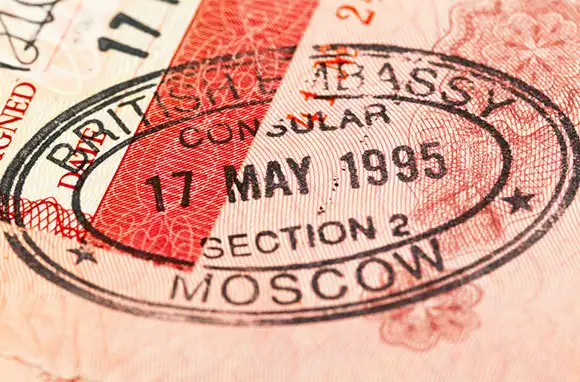
Want to be the perfect international traveler? It’s all about research, preparation, and planning ahead. And, we admit, these things take work. But it will all pay off when you pass the passport inspection with flying colors, arrive at your destination with all the proper vaccinations, and greet the cabbie with a friendly “hello” in his native tongue—all without batting an eye. These 11 things to know before you go will take you from last-minute mess to expert globe-trotter, all in time for your next trip.
Image Gallery

Passport And Visa Requirements
One of the most important things to do before you travel abroad is to check your destination's passport and visa requirements. Every country has different rules, and it can take several weeks or months to obtain the proper documentation, so advance planning is crucial.
First rule of thumb: Having a passport is not always enough. Many countries require that your passport be valid for up to six months beyond the end date of your vacation. For example, if your Singapore vacation ends in September, your passport must be valid until March of the following year. Be sure to check the U.S. Department of State's website for detailed country-specific information about your destination's passport requirements.
Some countries will not admit you unless your passport has a very specific number of blank visa pages at the end. If your itinerary includes multiple nations, make sure to check the blank-page requirements—either one blank page or two—for each country. If you need to add extra pages to your passport before your trip, follow these instructions and mail in the necessary fee with a completed form. But keep in mind that it takes approximately four to six weeks for applications to be processed (check here for updates on routine and expedited application-processing times).
After making sure your passport is up to snuff, find out whether your destination requires a visa in order to gain entry. The State Department's website allows you to search by country for your destination's entry requirements. You can also check the country's U.S. embassy website for detailed information about entry and exit requirements for American visitors. While some countries do not require a visa at all, others have a more difficult process that involves obtaining a visa in person from your nearest consulate.

Passport And Visa Requirements
One of the most important things to do before you travel abroad is to check your destination's passport and visa requirements. Every country has different rules, and it can take several weeks or months to obtain the proper documentation, so advance planning is crucial.
First rule of thumb: Having a passport is not always enough. Many countries require that your passport be valid for up to six months beyond the end date of your vacation. For example, if your Singapore vacation ends in September, your passport must be valid until March of the following year. Be sure to check the U.S. Department of State's website for detailed country-specific information about your destination's passport requirements.
Some countries will not admit you unless your passport has a very specific number of blank visa pages at the end. If your itinerary includes multiple nations, make sure to check the blank-page requirements—either one blank page or two—for each country. If you need to add extra pages to your passport before your trip, follow these instructions and mail in the necessary fee with a completed form. But keep in mind that it takes approximately four to six weeks for applications to be processed (check here for updates on routine and expedited application-processing times).
After making sure your passport is up to snuff, find out whether your destination requires a visa in order to gain entry. The State Department's website allows you to search by country for your destination's entry requirements. You can also check the country's U.S. embassy website for detailed information about entry and exit requirements for American visitors. While some countries do not require a visa at all, others have a more difficult process that involves obtaining a visa in person from your nearest consulate.

Weather
Before you book your trip, it's a good idea to check the weather in your destination to help determine which times of year are best for visiting. Once you book, the weather will determine the clothes you pack, the excursions you plan, and whether you should expect transportation delays.
Travel seasons are mostly determined by weather, and if you decide to take a peak-season vacation, you'll have to contend with other visitors who had the same idea. But the benefits of high-season travel—gorgeous weather, long days, and the resultant high spirits—can outweigh both the hoards and the high prices. But don't discount off-season vacations, either: A low-season trip can deliver unexpected benefits.
In the week or so before your trip, be sure to check the weather in your destination and stay abreast of any developing storms or adverse conditions. No matter how much you want to pack that cute new tank top, if the forecast says 50 degrees, it's time to put it back in the closet. And knowing what kind of weather is brewing will help determine how early you should arrive at the airport for your flight and whether to expect any train or bus delays once you land.

Seasonal Closings, Festivals, and Holidays
Accidentally booked a trip with your grandma to Brazil, only to be greeted by half-naked ladies and drunken revelers? You should have checked this year's Carnival dates. Didn't realize that much of Italy shuts down over the Easter holiday? It's important to know about seasonal closings, holidays, and festivals in your destination before you book your trip.
In some places, restaurants and tourist sites operate on shorter schedules or even close completely during the winter months (and also in August, due to workers' vacations). Be sure to do your research before booking your travel or risk being met with a ghost town upon arrival.
And while it can be great fun to partake in holiday celebrations and festivals in a different country, you should expect the logistics of travel to be a bit more difficult, the crowds to be bigger, and many local businesses to be closed. So before you set the dates for your spring trip to Italy, decide whether seeing Florence's Easter Sunday Scoppio del Carro ("Explosion of the Cart") celebration—involving a wooden cart, fireworks, and a blazing mechanical-dove rocket—is worth the public-holiday hassle.

Health
Before booking your travel, familiarize yourself with the health situation in your destination. The first step is learning about any health risks related to your country on the Centers for Disease Control and Prevention (CDC) destination page, which has health information for more than 200 international destinations. Next, check the CDC's travel notices page as well as the World Health Organization (WHO) for any travel health notices or warnings that apply to the country or countries in question.
The CDC then recommends that you visit a doctor, who will answer your questions and administer vaccines and medication according to your personal health, your medical history, and the requirements of the country you plan to visit. Vaccines for travel can be separated into three categories: routine, recommended, and required. Make sure you're up-to-date on routine vaccinations (like the seasonal flu vaccine, recommended annually for adults), talk to your doctor about vaccines specifically recommended for your destination, and be sure to get any required vaccines. (The only required vaccines at this time are yellow fever for travel to some countries in sub-Saharan Africa and tropical South America, and meningitis for travel to Saudi Arabia during the Hajj.)
Beyond vaccines, the CDC website provides additional health information, such as food and water safety measures and country-by-country malaria information, including whether antimalarial drugs are recommended for your destination. Keep the CDC's wealth of information at your fingertips by downloading its free mobile app (available on Apple and Android).

Travel Warnings And Advisories
Before departing, find out whether the country or countries you intend to visit are under any severe travel warnings or alerts. Do this by checking the State Department's website for current warnings (for long-term conditions, like armed conflicts or security threats) and alerts (for short-term conditions, like regional sports events or mass demonstrations).
But try not to judge an entire country by just a few regions, or by its reputation alone. If the travel warning only advises against visiting a certain city or region, use your best judgment as to whether you still wish to visit that country—making sure to stay away from the area in question. Likewise, a country with a bad reputation might actually be in the midst of a revival, moving on from a legacy of violence or unrest and focusing on making cultural, social, and economic strides. (And that often translates to discounts on hotels and airfare as incentives for tourism.) By all means, don't ignore warnings, but don't make false assumptions about a place.
In addition, be sure to check with the CDC for any health-related alerts or notices in effect in your destination. The CDC will outline whether it's safe to visit—and, if it is, how to protect yourself from infection once you're there.

Local Laws and Customs
It's every traveler's nightmare: pulling a Claire Danes and accidentally getting thrown in jail in another country, where you don't speak the language or know your rights. And while you'd really have to step over the line in order for that to happen, it's worthwhile to brush up on local laws before embarking on your trip, if only to learn something new. You might be surprised at how quirky and unexpected some laws can be. They might even influence your packing list. Traveling to Greece? Think twice about wearing stiletto heels. And if you're wearing a tank top or shorts, you won't be allowed to enter many European churches.
In addition to learning the laws in your destination, make an effort to understand the customs and traditions by which people live, as well as the reasons behind them—be they religious, political, or otherwise. It's simply a matter of respect. So when in Japan, slurp to your heart's content, but don't wear your shoes inside of someone's home. You don't want to be rude, so make sure to study up before you go, lest you end up looking like an annoying American tourist.

Public-Transit Options
A great way to save money while on vacation is to commit to using public transportation in your destination. It will keep you on track with your budget and also allow you to see the city in a new and different light—the way locals do every day.
When planning your daily itinerary, peruse a map to figure out how you'll get from the museum to the coffee shop and back to the hotel. Familiarizing yourself with the city's layout will go a long way once you arrive in your destination—because no one wants to spend their vacation wandering around looking for bus stops. Download a city-specific transportation app, like SNCF Direct (the official app of the Paris Metro system, available on Apple, Android, and BlackBerry for free). In addition, plan to buy a multiday transit pass—it will almost always be more economical than purchasing single tickets for each ride.
Researching the system before you go will reduce the chances of a mishap when you arrive. If the city is known for having a difficult metro system or buses that are always late, pick and choose when you can afford to take a cab or plan to get your exercise by walking whenever you can. And keep in mind that not all public transportation runs late—in some cities, trains stop at midnight or shortly thereafter. You wouldn't want to get stranded by yourself late at night in a foreign city.

Language
To really immerse yourself in a new culture, you should make it a priority to learn at least a few phrases in the local language. This will keep you from looking ignorant and could also save your life in an emergency situation.
Locals will notice your effort, and many may be friendlier if you approach them in their native tongue. Memorize at least a few rudimentary words and sayings, such as "please," "thank you," and "help." If you have no ear for learning a new language, carry a few translated phrases with you on note cards. And when presented with a phrase you're not familiar with, try Google Translate (available on Apple and Android for free), which will quickly translate anything you type or speak into your phone.

Currency
Before you leave, call both your credit-card company and your bank to let them know that you will be traveling abroad in order to avoid getting your account flagged for suspicious activity. While you have your bank on the phone, find out if it charges a foreign-transaction fee and, if so, how much it is. Depending on the answer, you might want to look into using a credit card that doesn't add this surcharge.
You'll want to have some local currency in your pocket when you arrive in your destination, but we don't recommend changing money at the airport. The exchange desks usually charge the highest transaction fees since their last-minute customers don't have any other options. So shop around and make sure you find the best exchange rate (usually from your bank) before you go.
Once you arrive, make big purchases with a credit card but withdraw local currency (from an ATM within your bank's global network) with a debit card. And download OANDA's currency-converter app, which checks rates in more than 190 currencies and four metals for on-the-go calculations and before you make purchases.

Safety
Whether you're visiting a safe country or one that is thought to be on the risky side, you should take some necessary precautions. This means thoroughly researching the safety in your destination before you go, which will inform you of "good" and "bad" neighborhoods, whether it's smart to be out after dark, whether your destination has a problem with pickpockets, and the like. This, in turn, will influence where you book your hotel and spend your time.
If you're worried about thieves, follow our 10 tips for carrying money while traveling, including using a dummy wallet and dividing and storing your money and cards in multiple safe spots. In addition, keep your hotel's address private. And, as always, you'll reduce your chance of encountering a problem if you make a conscious effort to blend in with the locals—meaning no fanny packs or white tennis shoes.
Talk to a friend who has visited your destination or check out online forums to get a variety of opinions. Most of all, when visiting a new place, go with an open mind.

Arrival Or Departure Tax
Beyond passport and visa requirements, some countries have an additional requirement for visitors: an entry or exit tax. Check the State Department's country-by-country entry requirements to see if your destination is on the list.
The amount of the fee and how and when itâs charged vary by destination. Indonesia, for example, charges a 150,000 Rupiah departure tax at the Jakarta airport—and it must be paid in Rupiah. In Chile, U.S. visitors must pay a $160 "reciprocity fee" when they enter the country via Santiago International Airport. You don't want to be short on the required cash on your way in or out of the country, so hit up the ATM before you go.
More From Smartertravel:
We hand-pick everything we recommend and select items through testing and reviews. Some products are sent to us free of charge with no incentive to offer a favorable review. We offer our unbiased opinions and do not accept compensation to review products. All items are in stock and prices are accurate at the time of publication. If you buy something through our links, we may earn a commission.
Related
Top Fares From
Today's Top Travel Deals
Brought to you by ShermansTravel
Black Friday Sale: 6-Night India Tour,...
Exoticca
 vacation
$1599+
vacation
$1599+
Amsterdam to Copenhagen: Luxe, 18-Night Northern...
Regent Seven Seas Cruises
 cruise
$12399+
cruise
$12399+
Ohio: Daily Car Rentals from Cincinnati
85OFF.com
 Car Rental
$19+
Car Rental
$19+



